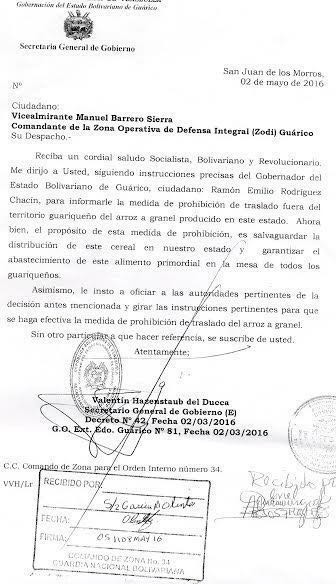Manuela and Holodomor
As the governor of Guárico bans rice from leaving his state, we take a detour through the theory of famines, and what Manuela Bolívar is doing to stop it.


El Estímulo has a specially important and, to my mind, terrifying piece yesterday. It turns out Guárico State Governor Ramón Rodríguez Chacín has decided that, in order to sustain Guariqueños’ access to the product, rice may not be physically transported outside of Guárico state.
It’s a mad decision, the kind of microprotectionist restriction that, in other contexts, has set the stage for outright famine. In Ukraine in 1932-33 and in Bengal ten years later, bureaucratic decisions to stop food from moving from food-surplus to famine areas played a major role in precipitating catastrophe.
But one other thing tipped those places: the absence of democracy, and of information. As Amartya Sen famously argued, famine is very seldom a function of absolute lack of food: much more often famine takes place where there’s plenty of food around, but the people who need it most can’t get to it. And that happens where government’s are undemocratic and, crucially, where information about the famine can’t flow.
Which brings us to VP Deputy Manuela Bolívar. It was Manuela who took Rodríguez Chacín’s alarming memo to El Estímulo, blowing the whistle on a blunder that could have incalculable consequences.
 It may not seem like that much, but Bolívar’s gesture, and El Estímulo’s bravery in publishing it, constitutes Venezuela’s best line of defense at this point against an even greater tragedy. We have serious theoretical reasons to believe that keeping information flowing actually can prevent a famine. It’s…no joking matter.
It may not seem like that much, but Bolívar’s gesture, and El Estímulo’s bravery in publishing it, constitutes Venezuela’s best line of defense at this point against an even greater tragedy. We have serious theoretical reasons to believe that keeping information flowing actually can prevent a famine. It’s…no joking matter.
Caracas Chronicles is 100% reader-supported.
We’ve been able to hang on for 22 years in one of the craziest media landscapes in the world. We’ve seen different media outlets in Venezuela (and abroad) closing shop, something we’re looking to avoid at all costs. Your collaboration goes a long way in helping us weather the storm.
Donate




